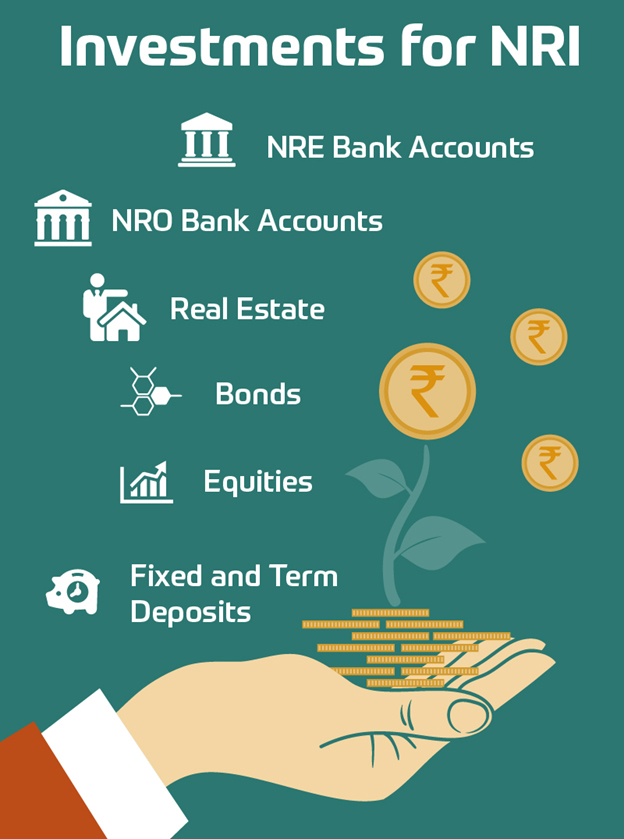
For many NRIs, establishing a stable financial future in India is still a dream come true, regardless of whether they are working hard in the financial center of New York City or enjoying the beaches of Dubai. But from a distance, navigating the investment landscape can feel like traveling through a foreign country. Do not be alarmed, fellow travelers! With the help of this in-depth guide, you can create a portfolio that matches your goals and uncovers the wide range of investment options at your disposal.read more on nri investment in India :

NRI investment in India
Low-Risk Guideposts for Consistent Returns:
- Fixed Deposits (FDs):
• NRE FDs: These offer competitive rates and tax-free interest upon maturity (subject to conditions), making them perfect for income earned overseas. To meet your liquidity needs, look into options with tenures ranging from less than a year to five years or more.
• NRO FDs: NRO FDs are subject to income tax slabs for income earned in India. They do, however, provide repatriation benefits, which let you return the principal and interest to your foreign account.
• FCNR (Foreign Currency Non-Resident) FDs: To protect yourself from currency fluctuations, invest in major foreign currencies such as USD, GBP, or EUR. Enjoy tax advantages and competitive interest rates, just like with NRE FDs.
- National Pension Schemes (NPS):
• Tier-I Account: Required for government workers, this tier provides attractive market-linked returns along with tax deductions on contributions. When one retires, one may take out a lump sum withdrawal from the corpus and use the remaining funds to buy an annuity.
• Tier-II Account: This optional tier, which is accessible to all, offers flexibility in terms of investment amounts and withdrawals as well as tax deductions on contributions (up to a certain amount). Perfect for building long-term wealth or planning retirement.
High-Rise Prospects for the Brave:
- Mutual funds:
• Equity Funds: Invest in funds that primarily hold the stocks of promising companies for a high-growth potential. Depending on your tolerance for risk, select large-cap, mid-cap, or small-cap mutual funds. For additional stability, diversify across industries.
• Debt Funds: Use debt funds that invest in corporate and government bonds to prioritize income and capital preservation. Perfect for short-term objectives or to moderate your exposure to equity.
• Hybrid Funds: Invest in both debt and equity instruments through hybrid funds to achieve a balanced approach. Depending on your desired balance between risk and return, select from aggressive hybrid funds, balanced funds, or arbitrage funds.
- Direct Equity:
• Open a Demat and Trading Account: These accounts allow you to buy and sell shares electronically. Select a trustworthy broker that offers competitive brokerage fees and experience with NRI investments.
• Analysis and Research: Before making an investment, thoroughly research the companies. To make well-informed decisions, examine financial statements, monitor market trends, and take professional advice into account.
• Begin with Blue-Chip Stocks: To reduce risk, assemble a portfolio of well-established, stable businesses. As your knowledge and risk tolerance increase, gradually diversify into mid-cap or small-cap stocks.
Beyond the Fundamentals: Adding Variety to Your Treasure Chest
- Real Estate:
• Residential vs. Commercial: Make the decision to rent out residential properties such as apartments or commercial properties like shops or offices. Think about things like demand, location, and upkeep expenses.
• Joint Ownership: To make tax and legal issues easier, think about owning property jointly with a resident family member. Additionally, it can make property maintenance and management easier.
• Market research: Prior to making an investment, examine regional market trends, property kinds, and rental yields. It can be beneficial to speak with a real estate agent experienced in NRI investments.
- Gold:
• Physical gold: Provides tangible ownership, but needs to be stored securely and is insured. Perfect if you appreciate the sentimental value of owning gold.
• Gold ETFs: Compared to physical gold, they are easier to store and trade like stocks. Watch the price of gold and make wise investments.
• Sovereign Gold Bonds: These are government-issued securities that guarantee capital protection and yield interest on the amount invested. Perfect for low-risk investors who want to be exposed to gold.
- What is miscellaneous insurance?Your Everyday Safety Net
- can we claim 2 term insurance from two companies?
- Insurance Surveyor Eligibility: Requirements and Qualifications Explained
- LIC Agent Exam Fees : Know everything
- IRDA online exam payment
Essential Voyage Tips for NRI Investors:
• Map Your Path Using Information: Keep yourself updated on the FEMA rules that affect NRI investments. Make thoughtful selections that adhere to these guidelines.
• Seek Professional Advice: Take someone with you when navigating! Seek advice from a financial advisor with experience in NRI investments. Their knowledge can help you create a plan that fits your risk tolerance and particular situation, making the process of investing easy.
• Establish an Anchor at Reputable Ports: Make investments with reputable banks, asset managers, and registered brokers. In the ocean of investments, transparency and trust are your mooring lines.
• Remain Alert, Trim the Sails: Keep a close eye on your investments and make necessary adjustments to your plan. You must stay on course by adjusting your sails in accordance with changing market conditions and personal objectives.
Recall that you have a vast ocean of investment opportunities to explore. You can create a solid portfolio that supports your financial objectives, safeguards your future, and deepens your ties to your native country by determining your risk tolerance, carefully examining your options, and consulting a financial advisor. Good luck with your investment endeavors!







